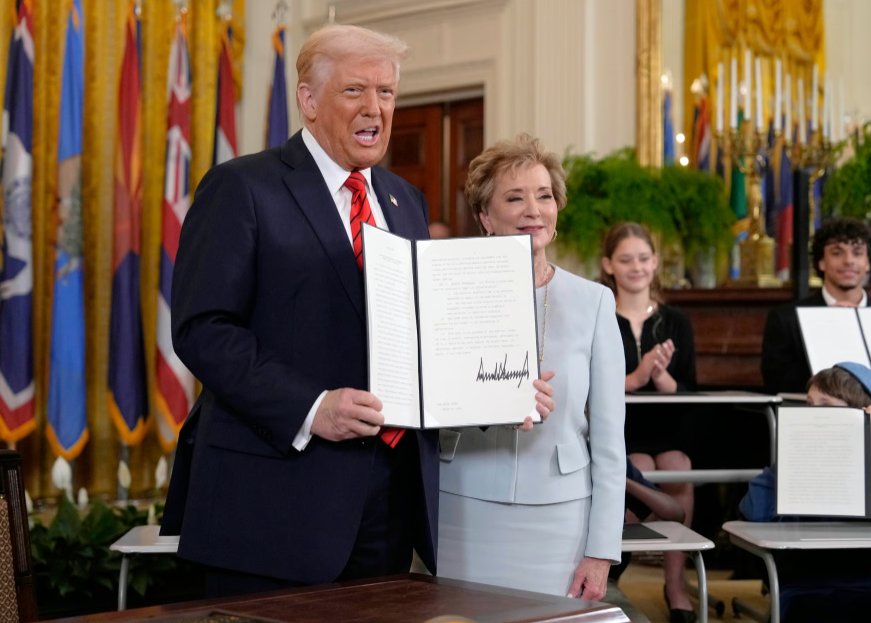Supreme Court Lets Trump Take Sledgehammer to Education Department
In a decision that marks a significant political and legal victory for former President Donald Trump, the U.S. Supreme Court has allowed the Trump-aligned plan to overhaul the Department of Education to move forward, at least for now. The high court declined to block efforts supported by a coalition of Republican-led states and education reform advocates seeking to curtail federal overreach and dismantle long-standing bureaucratic structures within the department.
The legal battle centers on Trump’s executive-backed initiative aimed at dramatically reducing the Department of Education’s scope, regulatory power, and influence over local and state educational decisions. This initiative, first rolled out earlier this year as part of Trump’s renewed campaign platform for 2025 and beyond, has been fiercely opposed by Democratic attorneys general, teachers’ unions, and public-sector education officials.
In a brief unsigned order, the court allowed a lower ruling to stand, which means Trump-aligned governors and education reformers can proceed with their efforts to roll back federal mandates tied to curricula, diversity initiatives, and Title IX expansions under the Biden administration. The Supreme Court’s decision was not a final ruling on the merits, but it signals that the conservative-majority bench is unwilling to intervene prematurely against Republican-led state reforms.
New York Attorney General Letitia James, who is leading a multi-state coalition challenging the move, described the plan as “an assault on American education and equality.” However, critics of the current system argue that centralized federal control has failed students, inflated costs, and promoted ideologically driven content under the guise of equity.
Trump has long criticized the Department of Education as an unnecessary and bloated agency that undermines local control and parent authority. “The federal government has no business pushing woke ideology into our classrooms,” Trump said in a campaign rally last month. “We will return education to the states and to the parents, where it belongs.”
Conservative Christian groups have applauded the court’s move, viewing it as a much-needed correction to decades of creeping secularism and leftist indoctrination in public schools. “This is about more than bureaucracy—this is about protecting our children from agendas that are hostile to faith, family, and truth,” said Mark Davidson of the Christian Family Policy Network.
The Supreme Court’s action clears the path for Trump’s proposed Education Freedom Plan, which includes initiatives to eliminate the Department of Education altogether if he returns to the White House. The plan would redirect education dollars to states, promote school choice programs, and prioritize classical learning models rooted in American history and Judeo-Christian values.
Education reformers argue that the Department of Education has grown too powerful since its establishment in 1979. Over the past several decades, federal standards and funding incentives have imposed top-down policies on states and school districts, often pressuring them to adopt progressive priorities. “Trump’s approach is bold and overdue,” said former Education Secretary Betsy DeVos, who supports decentralizing education. “We need to empower families and respect local values, not bow to Washington mandates.”
On the other side, liberal commentators and union leaders warn that dismantling federal oversight will erode equal access and civil rights protections. But many conservative educators disagree, noting that local communities are better equipped to reflect the values of their constituents while still complying with constitutional safeguards.
The legal coalition supporting Trump’s plan includes governors from Florida, Texas, South Dakota, and Arkansas—states that have already passed legislation limiting federal influence over state curricula. Florida Governor Ron DeSantis praised the Supreme Court’s stance, calling it “a huge victory for state sovereignty and the parental rights movement.”
Despite the Supreme Court’s temporary green light, legal battles are far from over. The underlying constitutional challenges will likely make their way back to the high court in full trial form within the next year. Until then, Trump’s allies will continue building momentum for what they see as a long-overdue realignment of American education.
Public opinion appears increasingly favorable toward such reforms. Polls show that a majority of Republican and Independent voters support giving parents more say in school policies, and many are frustrated with what they perceive as political bias in classrooms.
The Biden administration has yet to release a formal response to the Supreme Court’s order but is expected to issue strong statements opposing any further erosion of federal education authority. Education Secretary Miguel Cardona previously called Trump’s agenda “destructive,” though critics argue that Cardona’s own policies have prioritized social activism over academic excellence.
For now, the ruling provides Trump with a major symbolic and strategic win as he seeks to reassert leadership over the nation’s cultural and institutional foundations. Conservatives see this as the beginning of a broader rollback of federal overreach across multiple agencies.
“This is what leadership looks like,” said Texas Lt. Gov. Dan Patrick. “Finally, we’re seeing the courts acknowledge that D.C. doesn’t own our kids’ minds—or their futures.”
As legal challenges play out, the stage is set for education to become a central issue in the 2026 midterm elections and the 2028 presidential race, especially among voters concerned with religious freedom, parental rights, and constitutional limits on federal power.
Keywords:
Trump education department
Supreme Court ruling
federal overreach
school choice
parental rights
Department of Education
Christian education reform
state sovereignty
woke agenda in schools





